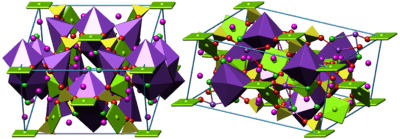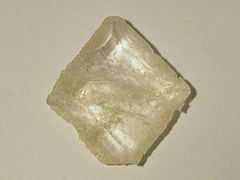Kainite
| Kainite | |
|---|---|
|
Kainite | |
| General | |
| Category | Sulfate minerals |
| Formula (repeating unit) | KMg(SO4)Cl·3H2O |
| Strunz classification | 07.DF.10 |
| Crystal symmetry |
Monoclinic prismatic H-M symbol: (2/m) Space group: C 2/m |
| Unit cell | a = 19.72 Å, b = 16.23 Å, c = 9.53 Å; β = 94.92° |
| Identification | |
| Color | Colorless; yellow, brownish, greyish-green, red, violet, blue |
| Crystal habit | Crystal aggregates, fibrous, massive |
| Crystal system | Monoclinic |
| Cleavage | {001}, perfect |
| Fracture | Splintery |
| Tenacity | Brittle |
| Mohs scale hardness | 2.5-3 |
| Luster | Vitreous |
| Streak | White |
| Diaphaneity | Transparent |
| Specific gravity | 2.15 |
| Optical properties | Biaxial (-) |
| Refractive index | nα = 1.494 nβ = 1.505 nγ = 1.516 |
| Birefringence | δ = 0.022 |
| Pleochroism | Visible: X = violet, Y = blue, Z = yellowish |
| 2V angle | Measured: 90° |
| Dispersion | Weak |
| References | [1][2][3] |
Kainite (KMg(SO4)Cl·3H2O) is a mineral salt that consists of potassium chloride and magnesium sulfate and is used as a fertilizer. This mineral is dull and soft, is colored white through yellow to red and is found in the Stassfurt salt mines in Saxony, Germany. It is a natural salt occurring in irregular granular masses, and is used as a source of potassium and magnesium compounds.

Crystal structure of kainite
